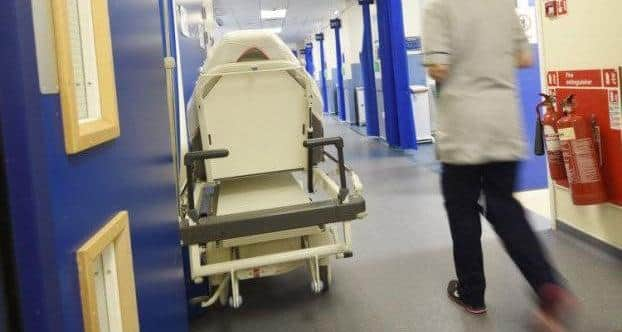Scottish hospitals see record-high levels of unavailable beds
Hospitals had record-high levels of unavailable beds due to delayed discharges in the month before the coronavirus outbreak hit, NHS Scotland figures show.
During February, an average of 1,616 hospital beds were occupied each day by patients who were well enough to leave but unable to be sent home, an increase of 11% from the same time last year.
Advertisement
Hide AdAdvertisement
Hide AdThe average number of delayed discharges in February was the highest since current records began in 2016, with a total of 46,875 days spent in hospital by people able to return home.


On the last Thursday in February - the date used as a census point for comparison - 1,290 people were stuck in hospital having been delayed more than three days, despite being well enough to leave.
Of these patients, health and social care reasons were blamed for 956 delays (74%), complex needs accounted for 302 delays (23%) and patient and family-related reasons for a further 32 delays (2%).
Health Secretary Jeane Freeman said that, since the first case of coronavirus was confirmed on March 2, there has been a "significant effort" to reduce the number of delayed discharges.
Ms Freeman said: "During the coronavirus outbreak we are working hard with those partnerships with the most significant level of delays to bring numbers down.
"Early indication for March is that we have seen a substantial reduction in the number of delays, down 800 so far on the end of the previous month, which is a 50% reduction. Our aim is to reduce this by 900 by the end of April.
"This is due to the significant effort from social work and social care staff, working with health partners and our health and social care partnerships, and I would like to thank them for their ongoing hard work.
"With the support of returning health and care professionals and volunteers, partnerships are working hard to ensure patients are discharged with appropriate care and support, ensuring people are cared for in the right setting and that vital hospital beds are there for those who need them during the current outbreak."
Advertisement
Hide AdAdvertisement
Hide AdScottish Labour's health spokeswoman Monica Lennon said: "Despite the Scottish Government promising to end delayed discharge, the latest figures show delayed discharge is at its highest-ever level.
"Delayed discharge is very distressing for patients and their families and puts the NHS under serious pressure.
"The coronavirus outbreak has prompted a colossal effort to free up beds, however, pressure has shifted to an already stretched social care service.
"It is vital that the Scottish Government gives carers the resources they need to work safely and meet the needs of the people they care for."
Scottish Liberal Democrat health spokesman Alex Cole-Hamilton added: "Being in hospital longer than necessary is always a real worry for patients and their families.
"At this time of crisis we know that the Scottish Government is trying to move as many people as possible into community care settings. Sadly many are worried about their safety there as well.
"The Scottish Government must urgently ensure health professionals working in care homes and community care have sufficient stocks of PPE as people are shifted out of hospital at an unprecedented rate."
Comments
Want to join the conversation? Please or to comment on this article.
